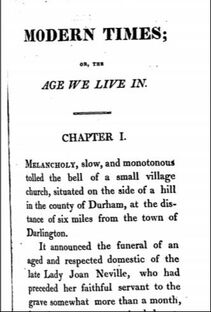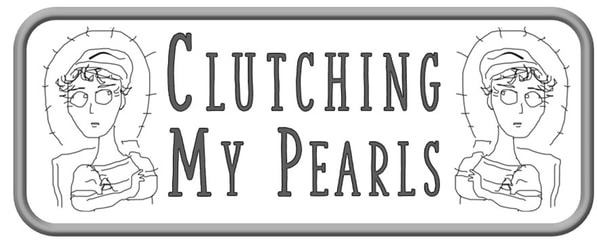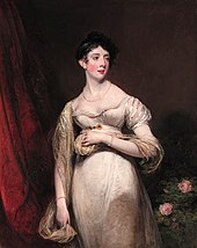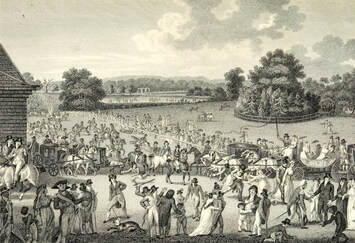| This is the second in my series about women writers of Austen's time. Click on the "Authoresses" category on the right for more. Elizabeth Helme (1753?-1814?) wrote several best-sellers. This discussion of Helme's novel Modern Times contains spoilers. |
| “Devereux Forester’s being ruined by his Vanity is extremely good; but I wish you would not let him plunge into a ‘vortex of Dissipation’. I do not object to the Thing, but I cannot bear the expression;–it is such thorough novel slang–and so old, that I dare say Adam met with it in the first novel he opened." -- Jane Austen, giving advice to her niece about novel-writing, September 28, 1814 |
| Maybe Jane Austen had Elizabeth Helme’s Modern Times: or, The Age We Live In, in mind when she gave her writing advice to her niece. Modern Times was published in April of 1814 and contained four "vortexes," including two "vortexes of dissipation." If Austen had read Helme's book, she might have wondered, in her turn, if Helme had read Sense & Sensibility; Modern Times features a family named Willoughby and the main character is a Colonel Brandon type. Sir Charles Neville wasn’t allowed to marry the girl he loved so he joined the army and went abroad for many years. Plus there are two sisters and the older one is virtuous and sensible while the younger one isn't. But otherwise Modern Times, and Helme, are very different from Austen. Modern Times is dedicated by permission to the Countess Cowper. Emily Lamb, Countess Cowper, was at the very top of the social and political tree, a patron of Almack’s, and later the wife of a prime minister. Her mother was notorious for her many love affairs and Countess Cowper herself had a long-standing relationship with Lord Palmerston, whom she married after Lord Cowper died. | Emily, Countess Cowper (1787–1869) by William Owen |
In the opening scene of the novel, the carriage conveying the widow, her spoilt daughter, and Sir Charles arrives at the old family estate. From the road overlooking the church yard they observe a funeral procession for a servant, with Elizabeth walking behind the coffin. Mom is horrified: “Can a daughter of mine… trudge on foot, like a common pauper, to the funeral of a domestic!”
A Brontë could have made so much of a scene like this – the tolling church bell, the mourners, the beautiful girl walking behind the coffin, the carriage silhouetted against the setting sun. However, Helme is not Brontë. Though Helme was praised for the moral tone of her novels, one of her reviewers said she should not “flatter herself with any expectation of figuring among the foremost of our literary countrywomen."
At any rate, Lady Neville, upon learning that smallpox is raging in the village, quickly turns the carriage around, but Sir Charles jumps out to comfort his niece Elizabeth, and to visit the grave of his long-lost sweetheart. Then we meet the virtuous clergyman Mr. Willoughby and his family, and the virtuous but poor clergyman Mr. Griffiths and his family.
Then, long story short, everybody goes to live in London where some idle cads who have gambled their inheritances away set their sights on the young heiresses Elizabeth and Fanny. Fanny and Elizabeth are kept in the background for long stretches of the novel; as though Helme wasn’t interested in them or didn’t know how to make them interesting. The girls do the usual heroine stuff: they are covered with confusion, they blush, they turn of a deathly pallor and faint dead away when the plot calls for it.
| Sir Charles helps the virtuous poor: he hires Miss Griffiths as governess for the girls and pays her a handsome wage, he purchases army commissions for Charles Willoughby and Edward Griffiths, the clergymen's sons. Sir Charles also patiently helps several high-born characters who have messed up their lives. Lady Belvue owes a fortune to various tradesmen and she has lost a fortune at the gaming tables but when bankruptcy and disgrace are staring her in the face, she vows to reform: “Alas! Sir Charles, harpies, vultures, sharpers have been, I shame to say, so long my associates, that all rectitude, all sense of moral and religious obligation has been obliterated and lost in the overwhelming vortex of gaming and dissipation!” Likewise, the vortex of London is initially alluring for Fanny. Her head is turned by all the attention she gets, but not for long. | Some of the action of Modern Times takes place in Hyde Park where Lady Neville goes in her carriage to see and be seen. Fanny and Elizabeth's careless suitors accidentally cause the carriage horses to bolt. The girls are thrown into the Serpentine but are rescued from drowning by the poor but gallant Charles Willoughby and Edward Griffiths. |

There are three weddings at the end (Miss Griffiths the governess finds love as well), but unlike Colonel Brandon, Sir Charles Neville doesn't remarry and there is no hint of a romance for him. He is too old, perhaps, to ever feel or inspire affection again.
Since Modern Times is a posthumous novel, possibly Elizabeth Helme was dying when she wrote it; the happy wrapping-up at the end is rather abrupt and might even have been written by someone else. Out of the blue, a long-lost relative returns from India with a staggering fortune and the virtuous get their reward here on earth. Although Helme is critical of slavery in the West Indian part of the narrative, she still uses the a "golden nabob" as a plot device. As I’ve learned, “Uncle So-and-So died and left you his dubiously-acquired fortune” is an exceedingly common plot device for the era and even Charlotte Brontë wasn't above using it in Jane Eyre.
The University of Cambridge Orlando database sums up Helme thusly: “Her novels abound in cliché but deploy their derivative plots, characters, and diction with attractive energy and conviction. She is interested in problems of class, race, and social justice, though given to finding easy fictional solutions for them.”
More about Elizabeth Helme and her connections to Jane Austen here and here.
Next post: Is Colonel Brandon a good guy or a moral monster?
| When the news of the victory at Waterloo reached England, many towns held celebratory bonfires to mark the defeat of Napoleon after decades of war. There's one such bonfire in my novel, A Different Kind of Woman, where Mary Crawford has to deal with an unwanted admirer who makes trouble for her. Click here for more about my books. |
| Clutching My Pearls is about Jane Austen, her values, and the values of the age in which she lived. Click here for the first in the series. |



 RSS Feed
RSS Feed